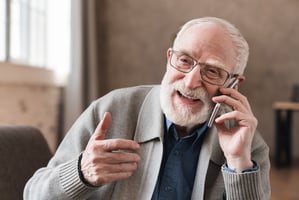"Purpose in Life" Linked to Better Physical Functioning in Older Individuals
 |
The study adds to a growing literature supporting “positive psychiatry”—a focus on psychological strengths such as resilience and purpose—and supports the idea that clinicians should discuss purpose of life with their older patients.
Eric Kim, Ph.D., of the Harvard T.H. Chan School of Public Health and colleagues analyzed data from the Health and Retirement Study, an ongoing nationally representative panel study of U.S. adults older than 50 years, at two points—2006 and 2010. Purpose in life was assessed in 2006 using the seven-item Purpose in Life subscale of the Ryff Psychological Well-being Scales, in which respondents rate the degree to which they agree with a statement (for example, “Some people wander aimlessly through life, but I am not one of them”) on a six-point Likert Scale.
At both time points (2006 and 2010) hand grip strength and walking speed were assessed using standard protocols and measurement tools.
The researchers found higher baseline purpose in life was associated with decreased risk of developing slow walking speed during four years of follow-up and small increases in walking speed among people with high purpose. Higher purpose was also associated with increases in grip strength but was less robustly associated with decreased risk of developing weak grip strength.
“Although mechanisms that explain the potential health effects of purpose have not yet been clearly defined, there are likely indirect (such as, other health-related behaviors) and/or direct effects (such as, altered biological function),” Kim and colleagues wrote. “For example, people with higher purpose are more proactive in taking care of their health, have better impulse control, and engage in healthier activities.”
Past APA President Dilip Jeste, M.D. (pictured above), director of the UC San Diego Center for Healthy Aging, said the results are supportive of a large body of research emerging in the last decade showing an association between psychological well-being and measures of physical health.
Similarly, he said a robust literature has linked speed of walking and hand grip to biological age. “These two discrete measures have come to be regarded as a shorthand for biological age, a clinical marker for aging,” he said.
Finding meaning and purpose in life is especially critical—and can be challenging—for adults who have retired from jobs that for years may have served as their identity. “There’s no single answer to the purpose of life and it will be different for different people,” Jeste told Psychiatric News. “Clinicians can help with this task and should ask their older patients, ‘What’s your purpose in life?’ because patients may not bring the subject up themselves.”
For related information, see Positive Psychiatry: A Clinical Handbook, coedited by Dilip Jeste, M.D.





